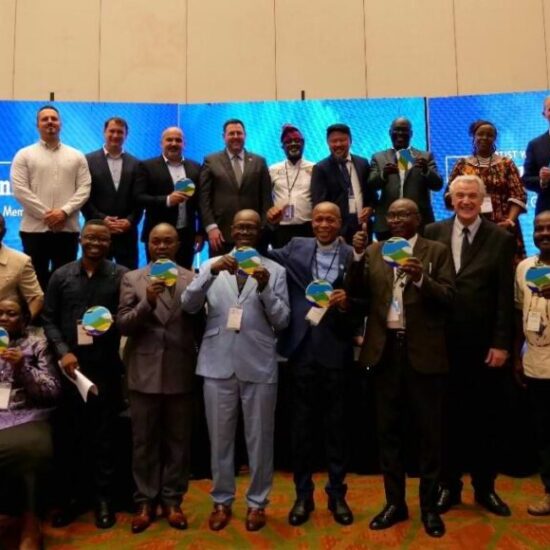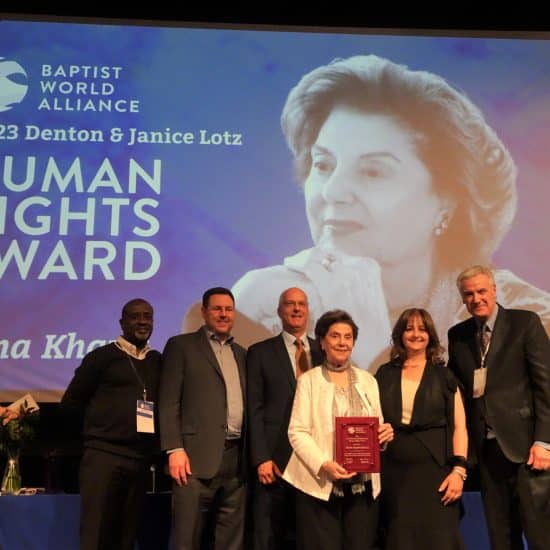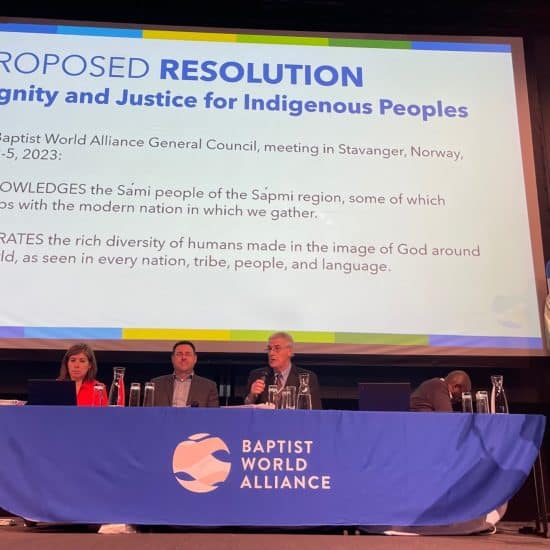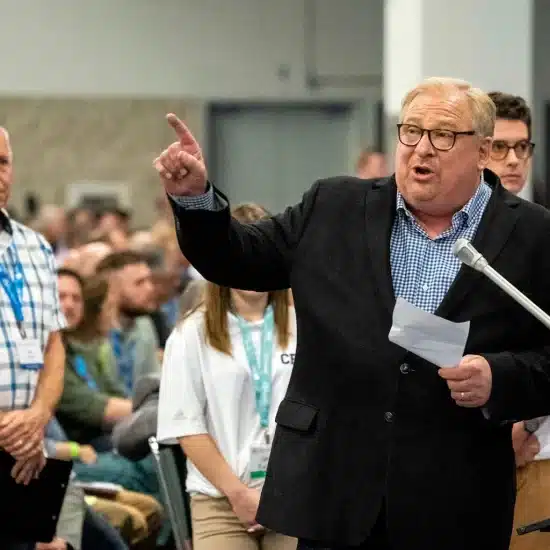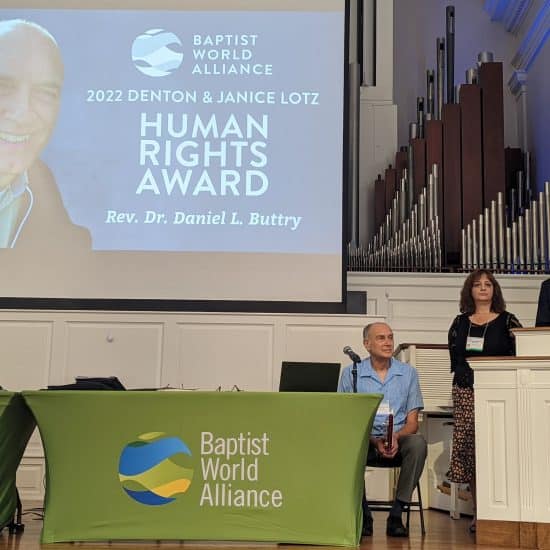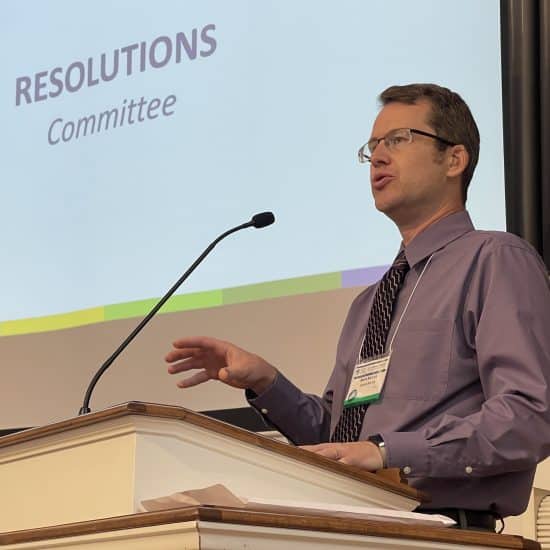Elijah Brown, originally from Texas, started in January as the ninth general secretary of the Baptist World Alliance. Word&Way Editor Brian Kaylor sat down with Brown in March in the BWA offices in Falls Church, Va.
You are the general secretary of the Baptist World Alliance? For those who don’t know about the BWA, can you tell us a little bit about what the Baptist World Alliance is?
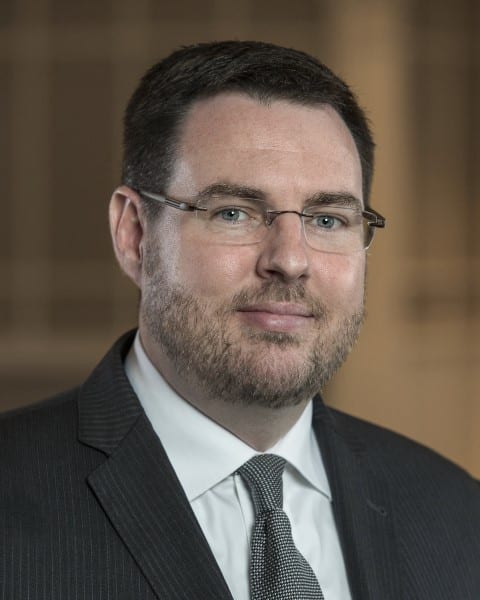 Elijah Brown Formed in 1905, the Baptist World Alliance has a 112-year-old history of seeking to live out our mission statement: networking the Baptist family to impact the world for Christ.
Elijah Brown Formed in 1905, the Baptist World Alliance has a 112-year-old history of seeking to live out our mission statement: networking the Baptist family to impact the world for Christ.
The five key program areas of the Baptist World Alliance are: to promote worship, fellowship and unity; to lead in mission and evangelism; to respond to people in need; to defend human rights and justice; and to advance relevant theological reflection.
So, why is the BWA important for local Baptist churches and individuals?
The Baptist World Alliance is your network to the world. With 238 member bodies in 124 countries and territories, the Baptist World Alliance really and truly is a global platform to build global partnerships, global mission opportunities and global relationships. It’s an opportunity to stand alongside many around the world who are seeing the Lord doing incredible work and yet sometimes face some really challenging circumstances.
The Baptist World Alliance remains incredibly important today for Baptist pastors in Myanmar who are incarcerated for their faith, for the 25 Russian Baptist pastors who have been arrested and fined on average two weeks’ worth of their salary the last 18 months or so for sharing their faith and sharing the gospel of Jesus Christ. The Baptist World Alliance remains incredibly important for the Baptists in the Middle East and in Europe who are living into the greatest refugee.
The Baptist World Alliance is important to Baptists in Africa and Latin America who are experiencing incredible growth and yet face real challenges in terms of theological education. And even for those of us here in North America, the Baptist World Alliance is a reminder that the hand of the Lord is on Baptists around the world and that we have an opportunity to join God in what he is doing and to stand in partnership with what he is doing.
A couple of the items that you mentioned deal with issues of religious liberty. I’ve known you for several years and know that is a passion of yours and something you’ve been highly engaged in with other organizations where you’ve worked. I wonder if you could share a little bit why religious liberty for all is so important to you, particularly as a Baptist?
It’s part of not only our denominational heritage, it’s core to our biblical understanding. Beginning all the way back in Genesis chapter 1, where the scriptures tell us that male and female are made in the image of God. We are born free. We are born equal. We are all born equidistant from the heart of God. And we all have an opportunity to choose to have a relationship with Jesus Christ.
Seeing that all people are free has a number of implications for the way in which we seek to live out our faith. One of those is certainly the area of religious freedom. Believing in soul competency of each individual, that God loves and values and respects and desires us to freely choose him out of love, so we give that opportunity to all people of all faiths. It’s part of being a neighbor. It’s part of living out God’s love and God’s grace in our world today.
That passage also has a missions implication. If I affirm that God is the author and creator of every individual life around the world, that also means I have a responsibility to share that God with each and every individual. It’s inconsistent to say “I believe that God made you, but I will not tell you about the God in whose image you are made.”
I know you’ve been involved in the BWA for over a decade, but you just started this job as general secretary — or, sometimes in more U.S. terms, an executive director type of position — in January. So, what have been some of the surprises or things that you’ve learned in these first couple of months?
One of the pleasant surprises coming in was to see how much work the Baptist World Alliance has done in leading in missions and evangelism. For example, in 2017, through the Baptist Fund for World Evangelization and Discipleship that’s facilitated through the Baptist World Alliance, we were able to produce grants to the Nepalese Baptist Convention who took that grant and printed and distributed 35,000 evangelism tracts in five unreached villages in Nepal.
We were also able to give a grant to the Baptist convention in the Central African Republic, who took that grant and planted 10 new churches reaching out to the pygmy people group in their country. And in the first year, those 10 churches reached 4,200 people with the love of Jesus Christ.
We’re both Baptists coming from the United States context, where we often hear stories of doom and gloom and the church is in decline. And it’s inspiring — as well as convicting — and hopeful to hear these stories and see the Baptists flourishing and growing throughout the world.
I agree completely.
Within the BWA family, in the last 25 years, this incredible explosion of the faith all around the world: 76 percent growth in the Caribbean, 119 percent growth in Asia-Pacific, 190 percent growth in Latin America and 800 percent growth in Africa. The Lord is at work. Let us join where he is at work.
You’ve traveled to many countries during your work both with the BWA and other organizations. I wonder if you could share about an experience that I’ve heard you share about before. Right after your election as BWA general secretary last July in Bangkok, Thailand, you went next door to Myanmar. Can you talk about that trip and particularly about visiting Baptists?
There’s a large Baptist family inside Myanmar that really in many ways traces its roots back to American missionary Adoniram Judson. And, so, we’re grateful for the ongoing witness and the ongoing impact missions continues to have inside Myanmar. It is one of the countries with the largest Baptist families anywhere in the world.
Myanmar itself is going through a time of transition as they are seeking to open up and become a more democratic country. And, yet, there are real challenges that persist inside the country.
I wish all could have been there as we gathered together literally with thousands of people in these open-air meetings to celebrate the life of Myanmar Baptists and the broader global family. And to hear them sing and to dance and to even write songs on the spot about what it means to be a Baptist, to be part of the Baptist family.
I wish you could’ve been there to have visited with the youth department, who have launched a city-wide campaign to collect blood. There is no blood bank in the city. And, so, the Baptist youth have created a system that when a person is at the hospital — regardless of their particular faith background — and needs blood, they call the Baptist convention youth. And they go to all the churches and they say we need someone to come down and donate blood now. It’s amazing to see that kind of creative energy that is meeting real needs while speaking to the hope of the kingdom.
And, yet, we know there are ongoing challenges. I remain deeply concerned, although it’s not for Baptists, but for the Rohingya Muslims situation. In the last six months or so, about 500,000 Rohingya have been forced to flee as refugees into Bangladesh. It’s graphic. It’s tragic. And it’s certainly ethnic cleansing if not outright genocide.
When I was in Myanmar, I asked some of the local individuals if the stories we were hearing were true. In response, one person shared a story. He said not long ago there were four Rohingya Muslims who were in our area and an elderly grandmother saw them walking on the road and had compassion upon them. She invited these four Rohingya individuals to come up to her porch. She gave them a meal and sent them on their way. When the local government officials found that this grandmother had fed these four Rohingya individuals, they incarcerated her for two weeks.
Let us pray, not only for our Baptist brothers and sisters where there are Baptists who are incarcerated for their faith, but also for the Rohingya who are facing this incredible, tragic ethnic cleansing.
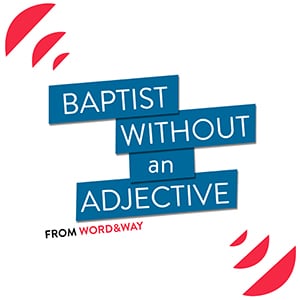 Note: A longer version of this conversation can be heard in the first episode of the new weekly Word&Way podcast, “Baptist Without An Adjective.” Among additional content in the full interview, Brown talks about what he learned from Syrian Baptists. A page to all the episodes of this program, which started in late March, can be found at Listen Notes or subscribed to through iTunes.
Note: A longer version of this conversation can be heard in the first episode of the new weekly Word&Way podcast, “Baptist Without An Adjective.” Among additional content in the full interview, Brown talks about what he learned from Syrian Baptists. A page to all the episodes of this program, which started in late March, can be found at Listen Notes or subscribed to through iTunes.

